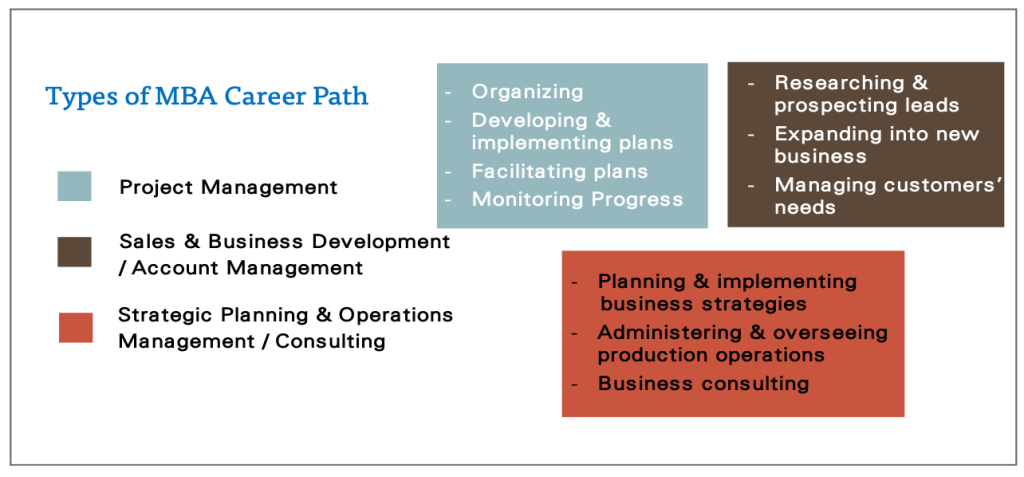The key characteristic of an MBA programme’s curriculum is its direct applicability to the duties and responsibilities that employers prize most in business managers and finance managers. Prospective Students Survey in 2021 found that 84% of candidates agreed or strongly agreed that a graduate business degree helps them stand out with their employers.
While industries and roles vary widely, the pursuit of MBA will lead to three general categories of career paths, namely, project management, business development and account management, and strategic planning and operations:

Project management is a frequent affair of most businesses that requires key managers’ core skills of organising, developing, implementing, and facilitating project plans. Hence, a well-organised team comprising members from multiple departments is essential to achieving its short- and long-term goals while staying on budget. In addition to strong communication and motivation skills, managers must exhibit leadership skills, organisational ability and attention to detail. Senior project management positions have titles such as business development director and senior managing consultant.
Sales and Business Development concerns researching, prospecting and qualifying leads before contacting the prospects and closing the deal. Consequently, the organisation will expand business ventures into new areas or horizons by identifying, attracting, and acquiring strategic business partners.
Account Management involves day-to-day interactions with a company’s existing customers. The goal is to ensure that all the customers’ needs are met on a continuing basis. Account managers must have essential financial and business management skills to retain existing customers.
From a macro perspective, Strategic Planning involves determining the organisation’s strategic position before prioritising its objectives, followed by creating a strategic plan to achieve them. The strategic plan will be implemented and monitored by measuring key performance indicators (KPIs), which are then reviewed and revised based on past successes or failures.
The focus of Operations Management is at the micro level of a strategic plan. It involves the administration of business practices to ensure efficiency, oversight of material and labour conversion into goods and services, and balancing costs with revenue to maximise net operating profit. A key aspect of operations management is the supply chain management.
In Management Consulting, the business analysts work on a plan or project basis by focusing on specific outcomes. Consultants may specialise in certain industries or organisation functions, such as human resources or financial restructuring. They often work directly with the organisation’s leaders to identify problems, collect information, and implement solutions.

Specifically, the nine MBA career paths explored here represent the range of career opportunities in industries and fields experiencing high growth:
- Finance: This career path involves roles in investment banking, corporate finance, private equity, and financial planning.
- Marketing: Marketers create and execute strategies for product promotion, branding, and market research.
- Consulting: Management consultants offer advice on business strategy, operations, and problem-solving to various clients.
- Entrepreneurship: Entrepreneurs start and run their own businesses, often based on innovative ideas.
- Human Resources: HR professionals manage talent acquisition, training, compensation, and employee relations.
- Operations Management: These roles focus on optimising processes and supply chain management within organisations.
- Information Technology: IT managers oversee technology infrastructure and systems in organisations.
- Healthcare Management: This niche involves managing healthcare facilities, policies, and healthcare-related businesses.
- Non-profit Management: Working in the non-profit sector involves managing organisations with a social or environmental mission.
The contemporary economy is marked by rapid technological advancements, globalisation, and the need for adaptability. Our future economic landscape may continue to evolve with digital transformation, sustainability concerns, and shifts in consumer behaviour. Even though an MBA can open doors to a wide range of career opportunities, ultimate success depends on individual goals, adaptability, and the ability to stay relevant in a dynamic economy.

About the Author:
DR JERRY KOAY
MBA Programme Leader, Graduate School of Business, SEGi College Subang Jaya
With a career spanning over three decades, Dr Jerry Koay was an industrial practitioner for 20 years in electronics manufacturing engineering and operations prior to his dedication to the education industry for more than 14 years. Currently, he leads the MBA programme of SEGi College Subang Jaya.
In a managerial capacity, he worked in various multinational corporations locally and abroad as a functional and operations manager in charge of production, process, equipment, and industrial engineering.
Being an ex-director of academic affairs, he chaired the academic board research board and served as a member of the executive management board. A passionate educationist, he lectured and supervised research in business schools in areas of operations management, project management, technology management, and change management in both undergraduate and postgraduate programmes of universities and colleges.





